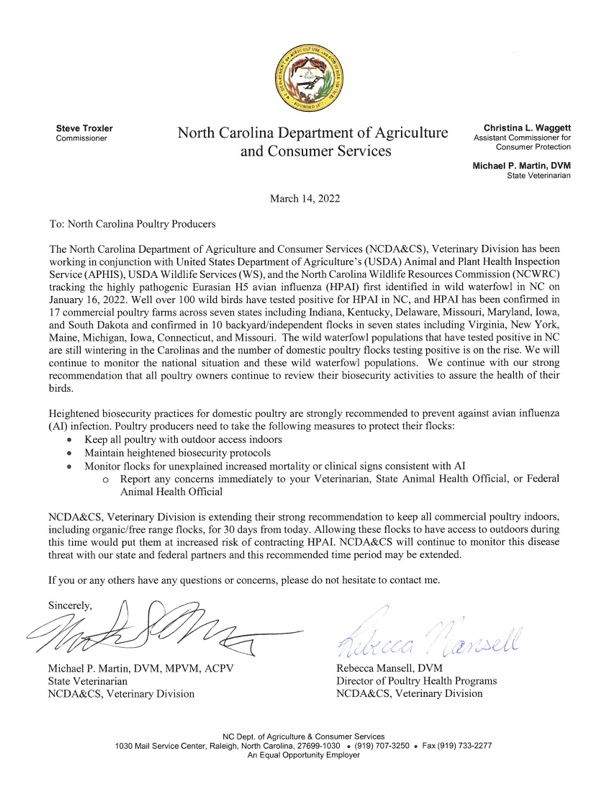Urgent Memo From NCDA&CS Concerning Backyard Poultry Flocks
go.ncsu.edu/readext?855386
en Español / em Português
El inglés es el idioma de control de esta página. En la medida en que haya algún conflicto entre la traducción al inglés y la traducción, el inglés prevalece.
Al hacer clic en el enlace de traducción se activa un servicio de traducción gratuito para convertir la página al español. Al igual que con cualquier traducción por Internet, la conversión no es sensible al contexto y puede que no traduzca el texto en su significado original. NC State Extension no garantiza la exactitud del texto traducido. Por favor, tenga en cuenta que algunas aplicaciones y/o servicios pueden no funcionar como se espera cuando se traducen.
Português
Inglês é o idioma de controle desta página. Na medida que haja algum conflito entre o texto original em Inglês e a tradução, o Inglês prevalece.
Ao clicar no link de tradução, um serviço gratuito de tradução será ativado para converter a página para o Português. Como em qualquer tradução pela internet, a conversão não é sensivel ao contexto e pode não ocorrer a tradução para o significado orginal. O serviço de Extensão da Carolina do Norte (NC State Extension) não garante a exatidão do texto traduzido. Por favor, observe que algumas funções ou serviços podem não funcionar como esperado após a tradução.
English
English is the controlling language of this page. To the extent there is any conflict between the English text and the translation, English controls.
Clicking on the translation link activates a free translation service to convert the page to Spanish. As with any Internet translation, the conversion is not context-sensitive and may not translate the text to its original meaning. NC State Extension does not guarantee the accuracy of the translated text. Please note that some applications and/or services may not function as expected when translated.
Collapse ▲On March 14, 2022, North Carolina Department of Agriculture and Consumer Services (NCDA&CS) Veterinary Division issued a memo warning from Dr. Michael Martin, State Veterinarian, and Dr. Rebecca Mansell, Director of Poultry Health Programs, to NC Poultry Producers. The memo states:
To: North Carolina Poultry Producers
The North Carolina Department of Agriculture and Consumer Services (NCDA&CS), Veterinary Division has been working in conjunction with United States Department of Agriculture’s (USDA) Animal and Plant Health Inspection Service (APHIS), USDA Wildlife Services (WS), and the North Carolina Wildlife Resources Commission (NCWRC) tracking the highly pathogenic Eurasian HS avian influenza (HPAI) first identified in wild waterfowl in NC on January 16, 2022. Well over 100 wild birds have tested positive for HPAI in NC, and HPAI has been confirmed in 17 commercial poultry farms across seven states including Indiana, Kentucky, Delaware, Missouri, Maryland, Iowa, and South Dakota and confirmed in 10 backyard/independent flocks in seven states including Virginia, New York, Maine, Michigan, Iowa, Connecticut, and Missouri. The wild waterfowl populations that have tested positive in NC are still wintering in the Carolinas and the number of domestic poultry flocks testing positive is on the rise. We will continue to monitor the national situation and these wild waterfowl populations. We continue with our strong recommendation that all poultry owners continue to review their biosecurity activities to assure the health of their birds.
Heightened biosecurity practices for domestic poultry are strongly recommended to prevent against avian influenza (AI) infection. Poultry producers need to take the following measures to protect their flocks:
- Keep all poultry with outdoor access indoors
- Maintain heightened biosecurity protocols
- Monitor flocks for unexplained increased mortality or clinical signs consistent with AI
- Report any concerns immediately to your Veterinarian, State Animal Health Official, or Federal Animal Health Official
NCDA&CS, Veterinary Division is extending their strong recommendation to keep all commercial poultry indoors, including organic/free range flocks, for 30 days from today. Allowing these flocks to have access to outdoors during this time would put them at increased risk of contracting HPAl. NCDA&CS will continue to monitor this disease threat with our state and federal partners and this recommended time period may be extended.
If you or any others have any questions or concerns, please do not hesitate to contact me.
The memo was signed by both Dr. Martin and Dr. Mansell. Contact information at the bottom of the memo lists the following numbers:
(919) 707-3250 phone
(919) 733-2277 fax
More information can be found on the NCDA&CS website via the following link: https://www.ncagr.gov/avianflu/index.htm





